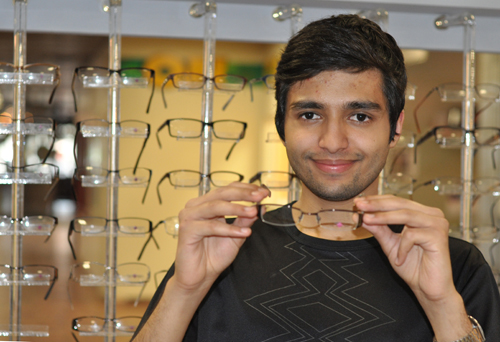When Gagan Dhaliwal met his grandmother for the first time, she was unable to see him because blindness had robbed her of her sight. She died without ever seeing her grandson. That experience inspired Dhaliwal, now a fourth-year biological science student at U of G, to volunteer with Unite for Sight, a non-profit organization that provides preventive eye care to people living in extreme poverty.
If his grandmother were alive today, he says she would be happy about his decision to help people like her regain their sight.
Dhaliwal says many people living in developing countries do not receive vision screening or regular check-ups, so they often suffer from eye diseases. These ailments also afflict Canadians, but “the difference here is that we can get treatment right away. In poorer countries, many people don’t have access, so it develops into something a lot more serious. By the time they realize something’s wrong, it’s too late.”
Dhaliwal found out about Unite for Sight while looking for something to do over the summer break. From Aug. 10 to 30, he will work with local medical staff at an eye clinic in Accra, Ghana, to screen patients in remote villages, help nurses perform visual acuity tests, and distribute prescription eyeglasses and medications. He will also be involved with organizing surgeries, treatment and outpatient care, as well as providing preventive health education.
Volunteering with the organization “really provides a clinical focus for me,” says Dhaliwal, who hopes to pursue a master’s degree in global health after completing his bachelor of science.
Thirty-six million people are needlessly blind worldwide, and 80 per cent of blindness can be prevented or cured with the right treatment, according to Unite for Sight. Vitamin A deficiency is one of the most common causes of blindness in developing countries, affecting up to 500,000 malnourished children each year. Prevention is as simple as taking vitamin A supplements, which cost a few cents per dose.
Those who are blind in Africa have a mortality rate four times the average for people with sight. Aside from the health implications, blindness also has socioeconomic consequences. Children are often expected to give up their schooling to stay home and care for a blind parent or grandparent. Adults with visual impairments are unable to work and provide for their families, creating a ripple effect of poverty.
This isn’t Dhaliwal’s first visit to a developing country. He has been volunteering with international development projects since his first year at Guelph, visiting orphanages and tribal groups in Bolivia with the Global Youth Network. He encourages other students to get involved in volunteer work that expands their horizons both academically and personally.
“When I travelled to Bolivia last time, it was an opportunity for me to step outside my comfort zone and explore things that you’re never taught in the classroom,” he says. “You really get a sense of perspective when you start asking ‘How can I apply my education, what’s the significance of what I’m learning, and how can I make the most of my time at university and beyond?’”
Unite for Sight has performed more than 42,000 eye surgeries and provided care for one million people. Each cataract surgery costs $50. Dhaliwal hopes to raise $2,000, which will cover the cost of surgery for 40 people. One hundred percent of donations will go toward providing eye health services; Dhaliwal is paying for his flight to Ghana as well as his meals and accommodations. He is also taking 500 pairs of donated eyeglasses.
For more information, visit the Unite for Sight website or contact Dhaliwal at gagandee@uoguelph.ca.
